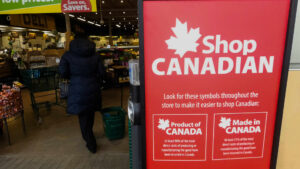Navigating Trade Tensions: The Impact of Tariffs on Canadian Small Businesses
In the ever-evolving landscape of North American trade, the ramifications of tariff policies have taken center stage, significantly impacting small businesses on both sides of the U.S.-Canada border. At Extreme Investor Network, we recognize the intricate nuances of these trade relationships and what they signify for entrepreneurs, consumers, and the economy as a whole.
A Troubling Change in Trade Dynamics
The longstanding trade relationship between the U.S. and Canada has historically been a cornerstone for both economies. In 2024 alone, trade between the two countries amounted to a staggering $762.1 billion. According to the Office of the United States Trade Representative, Canada relied heavily on the U.S. market, exporting over three-quarters of its goods there, while American imports constituted nearly half of Canada’s total goods intake.
However, the introduction of tariffs under the Trump administration—boasting a 10% tariff on Canadian energy and a hefty 25% on various imports—has unleashed waves of concern among Canadian small businesses. The implications of these tariffs go beyond mere numbers; they symbolize a growing divide and an erosion of trust in what has been a mutually beneficial trading partnership.
Resilient Responses from Canadian Businesses
Rather than capitulate to tariff-induced challenges, many Canadian businesses are rising to the occasion with creative solutions. Take Balzac’s Coffee Roasters, for instance. This popular café chain has embraced a patriotic twist on its menu by renaming the Americano to the "Canadiano," effectively turning a simple beverage into a statement of identity and defiance against trade tensions.
Similarly, Your Independent Grocers has established a maple leaf badge to showcase products "prepared in Canada," alongside a distinguishing "T" logo for items affected by tariffs. Such innovative marketing strategies not only rally community support but also enhance customer loyalty during a turbulent time.
The Emotional Toll on Business Owners
Trade dynamics often dwell in the realm of statistics and policies, but for many, they carry a heavy emotional weight. Corinne Pohlmann, executive vice president of the Canadian Federation of Independent Business (CFIB), highlights the distress felt by many small business owners. In a recent survey, over 50% of CFIB members voiced concerns about the reliability of the U.S. as a trading partner, revealing an unsettling shift in sentiment that could have lasting effects.
More than one-quarter of surveyed businesses reported a surge in demand for Canadian-made products. This response illustrates a growing sense of national pride among consumers, but it also raises questions about the long-term sustainability of these shifts as trade tensions persist.
The Ripple Effects of Retaliation
Canada’s response to U.S. tariffs has included its own retaliatory measures, reminiscent of a tit-for-tat dynamic that complicates traditional business relationships. The Liquor Control Board of Ontario (LCBO) took a bold step, halting purchases of American products like California wines and Tito’s Vodka. Their campaign, "For the good of Ontario, for the good of Canada," reflects a strategic repositioning that leverages local sentiment amidst growing nationalism.
However, it’s essential to understand that the landscape is not merely black and white. While locally produced goods are celebrated, the underlying issues remain volatile. Many Canadian companies produce goods in both Canada and the U.S.—such as Molson Coors, whose beers are often sourced locally—creating a complex web of brand loyalty and market dependence that is challenging to navigate.
The Future of U.S.-Canada Trade Relations
As we look ahead, the relationship between U.S. and Canadian businesses might be permanently altered. Even if tariffs are lifted, the lingering question remains: Can trust be rebuilt? Pohlmann’s insights into the emotional ramifications of trade tension indicate that small businesses may be hesitant to re-establish connections with U.S. partners, fearing future volatility.
At Extreme Investor Network, we encourage readers to stay informed about these developments. By understanding the broader implications of these trade tensions, investors and business owners alike can make more strategic decisions moving forward.
Conclusion: Building a Resilient Business Community
In a climate where tariffs and trade policies can change at a moment’s notice, fostering resilience is key for small businesses. Whether through creative marketing, community support, or local sourcing, Canadian entrepreneurs demonstrate an ability to adapt and thrive despite challenges. As business owners navigate this tumultuous terrain, they can find strength in camaraderie and the unyielding spirit of entrepreneurship.
Stay tuned to Extreme Investor Network for updates, insights, and strategies that can empower your journey in this complex business world. Together, we’ll face the challenges and opportunities that lie ahead in the dynamic realm of U.S.-Canada trade.

